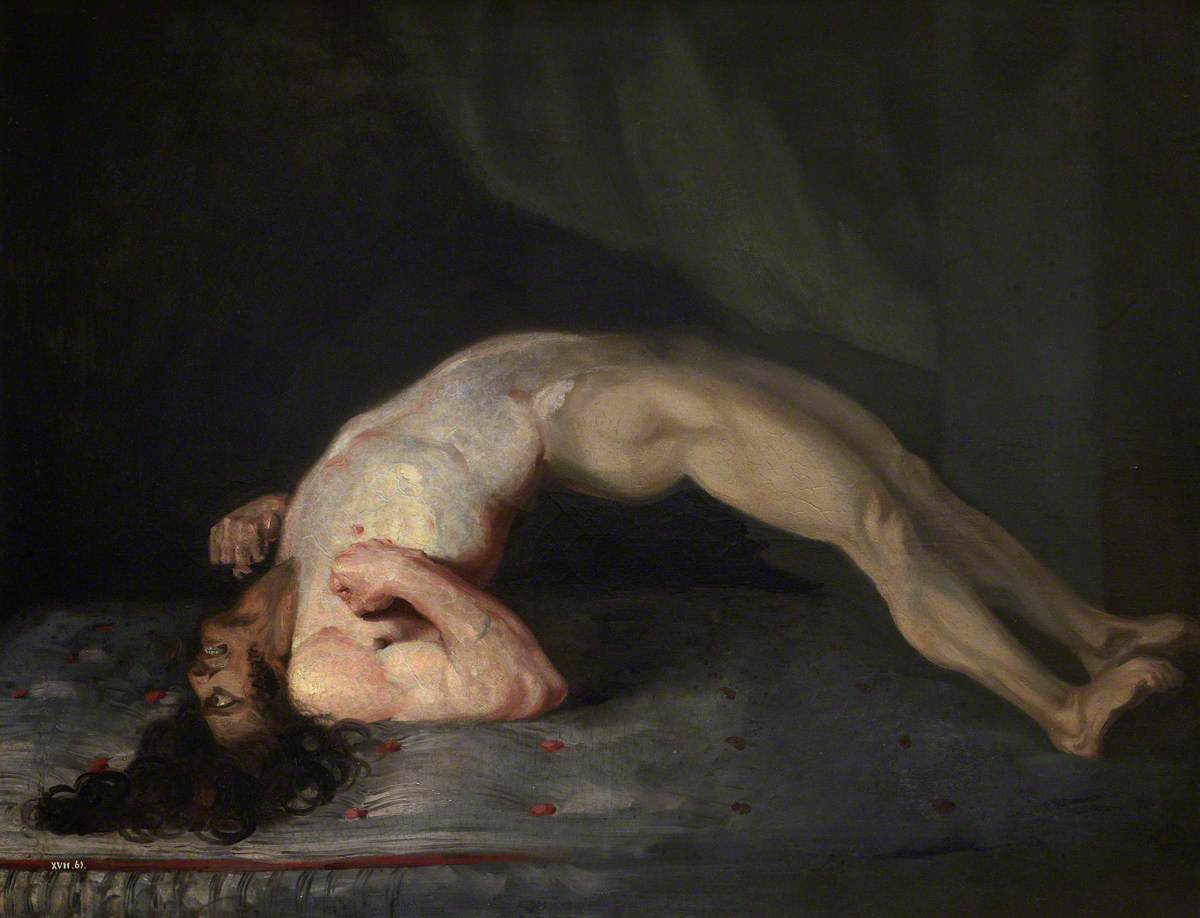Opisthotonus
Editor-In-Chief: Prab R Tumpati, MD
Obesity, Sleep & Internal medicine
Founder, WikiMD Wellnesspedia &
W8MD medical weight loss NYC and sleep center NYC
| Opisthotonus | |
|---|---|

| |
| Synonyms | N/A |
| Pronounce | N/A |
| Specialty | N/A |
| Symptoms | Severe muscle spasms, hyperextension of the back |
| Complications | Respiratory failure, aspiration pneumonia |
| Onset | Sudden |
| Duration | Variable |
| Types | N/A |
| Causes | Tetanus, meningitis, severe head injury, cerebral palsy |
| Risks | Infection, trauma |
| Diagnosis | Clinical evaluation, neurological examination |
| Differential diagnosis | Seizure disorder, dystonia, decerebrate posture |
| Prevention | N/A |
| Treatment | Muscle relaxants, sedation, antibiotics for infection |
| Medication | Diazepam, baclofen, dantrolene |
| Prognosis | Depends on underlying cause |
| Frequency | Rare |
| Deaths | N/A |
Opisthotonus or opisthotonos (from Ancient Greek: ὄπισθεν opisthen, meaning 'behind', and τόνος tonos, meaning 'tension') is a neurological condition characterized by extreme hyperextension and spasticity. In this state, an individual's head, neck, and spinal column enter into a pronounced arching or bridging position.
Causes[edit | edit source]
Opisthotonus can be caused by a variety of conditions, including:
- Meningitis
- Severe brain or spinal cord injuries
- Tetanus
- Neuroleptic malignant syndrome
- Certain metabolic disorders
Symptoms[edit | edit source]
The primary symptom of opisthotonus is the extreme backward arching of the head, neck, and spine. Other symptoms may include:
- Muscle stiffness and spasms
- Difficulty breathing
- Pain
Diagnosis[edit | edit source]
Diagnosis of opisthotonus involves:
- Neurological examination
- Medical history review
- Diagnostic imaging like MRI or CT scans
- Lumbar puncture, if meningitis is suspected
Treatment[edit | edit source]
Treatment focuses on managing the underlying cause and may include:
- Medications to relieve muscle stiffness and spasms
- Supportive care for breathing and feeding difficulties
- Physical therapy
External Links[edit | edit source]
Search WikiMD
Ad.Tired of being Overweight? Try W8MD's physician weight loss program.
Semaglutide (Ozempic / Wegovy and Tirzepatide (Mounjaro / Zepbound) available.
Advertise on WikiMD
|
WikiMD's Wellness Encyclopedia |
| Let Food Be Thy Medicine Medicine Thy Food - Hippocrates |
Translate this page: - East Asian
中文,
日本,
한국어,
South Asian
हिन्दी,
தமிழ்,
తెలుగు,
Urdu,
ಕನ್ನಡ,
Southeast Asian
Indonesian,
Vietnamese,
Thai,
မြန်မာဘာသာ,
বাংলা
European
español,
Deutsch,
français,
Greek,
português do Brasil,
polski,
română,
русский,
Nederlands,
norsk,
svenska,
suomi,
Italian
Middle Eastern & African
عربى,
Turkish,
Persian,
Hebrew,
Afrikaans,
isiZulu,
Kiswahili,
Other
Bulgarian,
Hungarian,
Czech,
Swedish,
മലയാളം,
मराठी,
ਪੰਜਾਬੀ,
ગુજરાતી,
Portuguese,
Ukrainian
Medical Disclaimer: WikiMD is not a substitute for professional medical advice. The information on WikiMD is provided as an information resource only, may be incorrect, outdated or misleading, and is not to be used or relied on for any diagnostic or treatment purposes. Please consult your health care provider before making any healthcare decisions or for guidance about a specific medical condition. WikiMD expressly disclaims responsibility, and shall have no liability, for any damages, loss, injury, or liability whatsoever suffered as a result of your reliance on the information contained in this site. By visiting this site you agree to the foregoing terms and conditions, which may from time to time be changed or supplemented by WikiMD. If you do not agree to the foregoing terms and conditions, you should not enter or use this site. See full disclaimer.
Credits:Most images are courtesy of Wikimedia commons, and templates, categories Wikipedia, licensed under CC BY SA or similar.
Contributors: Kondreddy Naveen, Prab R. Tumpati, MD

